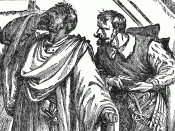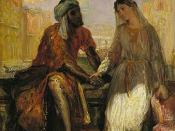Welcome actors, I am the director of this production of "Othello" and today I will be discussing the character of Iago in Act III, Scene III. My personal interpretation is based largely upon the themes of power and betrayal within the play; which is vital to how you all will interpret your characters. Power and betrayal are fundamental and universal ideas that are explored in Othello through a variety of means.
Within the structure of the play, power and betrayal appear as major catalysts for the preceding events. Betrayal is an important theme, because without it Iago would not have been able to achieve anything at all. Iagos' betrayal is portrayed to the audience mainly through his soliloquies; which display his incentives and create tension within the audience and the play.
Power is something that the characters within the play are trying to attain for different reasons.
For Othello, he has earnt his power through a life of hardship and has great confidence in this power. For Iago, however, he is desperately trying to attain power, and having not attained it through legitimate means such as Othello appointing him lieutenant, he reverts to betraying his friends in order to gain this power. His desire for power is once again displayed to the audience through his soliloquies.
Focusing on Iago's character development in particular we will explore how he interprets the play in terms of what I have just discussed; focusing on Act III, Scene III. Iago gains his power through means of manipulation and betrayal of other characters such as Othello. Throughout the scene, the audience witnesses the relentless insistence, subtlety and opportunism of Iago as he takes advantage of the trust Othello has placed in him. Firstly, planting the seeds of doubt...
![From the Library of Congress: TITLE: Thos. W. Keene. Othello CALL NUMBER: POS - TH - 1884 .O7, no. 1 (C size) [P&P] REPRODUCTION NUMBER: LC-USZC6-58 (color film copy transparency) RIGHTS INFORMATION: No known restrictions on publication. MEDIUM: 1 print (](https://s.writework.com/uploads/9/94760/library-congress-title-thos-w-keene-othello-call-number-pos-thumb.jpg)

